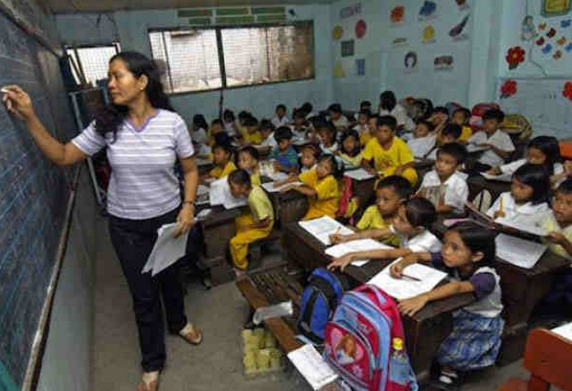The Department of Education has clarified that the Korean language subject in high schools in the country is only a foreign language elective, after the supposed inclusion of the subject in the basic education curriculum was raised in debates on the language subjects in Philippine schools.
The DepEd said in a statement released on Sunday, November 18 that the Korean elective offered in selected public schools in the country would not replace the Filipino subject in the curriculum.
According to the statement, the Korean elective was only one among the foreign language electives offered in schools across the country, along with Spanish, Japanese, French, German, and Chinese classes.
It also explained that its Special Program in Foreign Language was commonly offered to students from Grade 7 to 10 “who have demonstrated competence in Filipino and English, and are interested in and capable of learning another foreign language.”
The DepEd said that it issued the clarification after “misguided assertions” surrounding the subject.
Some Filipinos have questioned the presence of a Korean elective in the basic curriculum in the days after the Supreme Court ruled as valid a 2013 Commission on Higher Education memorandum that said that Filipino, ‘Panitikan’ and Constitution subjects were no longer required to be taught in the college curriculum.
yes im a kpop fan and i want to learn hangul but removing or changing the filipino subject to korean?? btch it's a big NO.
— danielle🍯 (@luvekth) November 16, 2018
Toxic Filipino culture: gettin rid of the FILIPINO language/subject in exchange to KOREAN language. Hey CHED! What did the KOREANS even do to Philippines? KOREAN OPPA?! is this even worthy to be in PHILIPPINE HISTORY?! Jose Rizal is Dead-ass fightin for nothin! 🗑 y tf?! pic.twitter.com/ic9twANIhE
— hɛdəɹə (@viytpie) November 13, 2018
Others joined the DepEd in clarifying the matter even as the debate on the Supreme Court ruling continues.
I AM SO TIRED OF THESE PEOPLE WHO KEEP RANTING ABOUT THE INTEGRATION OF THE ELECTIVE KOREAN LANGUAGE SUBJECT IN HS AND THE ABOLISHMENT OF FILIPINO IN COLLEGE WITHOUT HAVING THE LITTLEST AMOUNT OF RESEARCH ON THE ISSUES. PLEASE DON’T BE A BANDWAGON FALSE PATRIOT
— Brian Unabia (@bjunabia16) November 14, 2018
The answers on the revision of college curriculum
1. Nilipat ang Filipino subjects sa SHS
2. College will focus on the major courses
3. If may Filipino sa College, it is the same as what is taught in SHS
4. Korean and other languages is an elective subject, not a Mandatory one— 𝐆𝐀𝐔𝐓𝐓𝐈𝐄𝐑 (@gauttier) November 17, 2018
A debate on language in the curriculum
Several questions over the country’s educational institutions’ treatment of the Filipino language were raised after the release of the Supreme Court decision. National Artist for Literature and National Commission on Culture and the Arts chair Virgilio Almario, a well-regarded Filipino author, is among those who criticized the exclusion of Filipino and Panitikan as college subjects, saying that Filipino as a national language should be cultivated by being taught from the lowest to the highest educational level.
David San Juan of Filipino advocacy group Tanggol Wika, an associate professor of Filipino at De La Salle University, explained in a recent interview meanwhile that the decision could cost the jobs of 10,000 Filipino instructors across the country and cause organizational problems in educational institutions.
“Retooling or retraining of teachers entail a lot of work, if they change a subject to teach,” said San Juan during an interview while discussing the possibility of Filipino instructors shifting to teaching a different subject.
Some lawmakers, including Senate President Tito Sotto and Sen. Panfilo Lacson, also criticized the memorandum.
“We can see these days among the youth the lack of grasp of the Filipino language and by removing this as a core subject in college or any other school level, I fear this would deteriorate even further,” Sotto said. He added that Article XIV, Sec. 6 of the 1987 Constitution directed the government to enrich the use of Filipino as a native language and primary mode of communication and instruction in schools.
The CHED in a statement clarified that the reason the subjects were excluded from the required college subjects was because they were already taught in grade school and high school and that colleges had the option of choosing to include additional subjects in Filipino and Panitikan into their curriculum.










